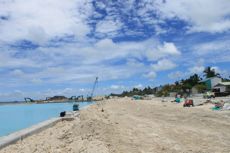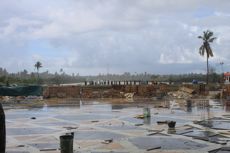Malé City Council has shut down the Dharumavantha Rasgefaanu mosque to stop unauthorised Friday prayers by a group described as “extremists” by the Minister of Islamic Affairs Sheikh Mohamed Shaheem Ali.
A City Council notice posted at the mosque said that on the Ministry of Home Affairs’ request it was to be temporarily shutdown following yesterday’s morning prayers.
Minivan News observed at the time of A’sr prayers that the mosque did not have any group congregation, however the notice posted at the mosque was no longer visible. Only a few individuals worshippers were present.
A copy of the Home Ministry letter signed by Minister Umar Naseer – posted along with the notice – requested the shutdown “as a first step” against unauthorised Friday prayers performed in the mosque.
The large congregation gathered at the mosque last Friday expressed their opposition through prayers asking Allah to weaken and current government and it’s leaders, CNM reported.
The worshipers at the mosque also prayed against the heads of the government, Islamic ministry and city council, asking for their ill-health and for a calamity to befall upon them.
The congregation asked Allah to destroy the government and to give victory against the “irreligious” government which attempts to obstruct the spreading of Allah’s message and to shut down mosques. Requesting victory, they also asked from Allah to destroy and send his wrath upon military and police officer who implement the government’s orders.
Jurisdiction
Following the Decentralisation Act of 2010, jurisdiction for all mosques falls under the island and city councils.
Malé City Councillor ‘Jambu’ Hassan Afeef who is in charge of managing the city mosques said the council will cooperate with the government, whether it is the police or the Islamic Ministry, in whatever measures needs to be taken to resolve the issue.
He said the Islamic Ministry had earlier sent a letter to the council regarding the mosque.
“We replied saying that the council’s mandate is to provide basic services for the public. If there is some irreligious activity going on, the ministry should get involved. And if something unlawful is going on, the Home Ministry and police should be involved,” said Afeef.
While police would not comment on the issue, the Ministry of Home Affairs said that the length of the mosque’s closure remains up to the city council and that the ministry has not yet decided on any future steps to be taken regarding the issue.
Minister Shaheem has previously stated that the ministry had no mandate to act against “undesirable activities” carried out in mosques. Shaheem and his Adhaalath Party have on various occasions demanded that mosques and Imams function under the Islamic Ministry’s authority.
“Broadening the role of mosques” was among the key eleven policy objectives recently revealed by the ministry.
Religious divisions and moderation
Umar Naseer has earlier acknowledged the existence of religious divisions in the Maldives and pledged to put an end to it. “Creating divisions in Islamic nations is the handiwork of enemies of Islam,” Naseer was quoted as saying in local media
Moderation was at the center of the Islamic Ministry’s recently revealed policies, while it was earlier criticised by members of the ruling coalition.
Minister Shaheem has earlier stated that the preaching at the Dharumavantha mosque can sometimes be “very extreme”.
Praying in congregations separate from the state-approved mosques under state-approved imams has often been described as a sign of Islamic extremism. Despite opposition from repeated governments, the practice has continued with the rise of religious extremism in Maldives.
An Azhar educated Islamic Scholar himself, President Gayoom has been accused of persecuting radicals and Wahhabis, including torturing religious scholars and groups who rejected the then-state approved version of Islam.
Commenting on the situation, a former member of the Dharumavantha mosque congregation told Minivan News that shutting down the mosque or arresting the members of congregation was unlikely to end it.
“You can’t change what people believe using force. Under Gayoom, I was arrested and kept in solitary confinement for weeks and sometimes months for praying in separate congregations and being involved with such groups. If anything, my convictions became even stronger and my thinking more radicalised,” he said.
He explained that many of his friends stopped going to the mosque around 2009 after being convinced it was wrong after dialogue with Islamic scholars.
“We are not one hundred percent happy about the way things are, but we realised we should be part of the community and not creating divisions. Now we are currently working with Islamic NGOs to create awareness – not just in Islamic issues but also social and even health issues,” he said.
“There is concern that things might be returning to how they were. But that will only make things worse. They should be educated and guided. I don’t agree with what they are doing either. But this is not how it should be dealt with,” he said.
Under President Mohamed Nasheed’s administration, regulation of religion was left mainly in the hands of conservative Adhaalath Party. More radical elements that strayed from the state-approved version of Islam were not persecuted at this time, despite their actions still being unlawful.
The government’s policy in combating extremism shifted to a rehabilitation model within this period.
Questioning the success of these efforts, the current Islamic Minister Sheikh Shaheem – who had earlier advocated for a similar model – has labelled it a failure.

